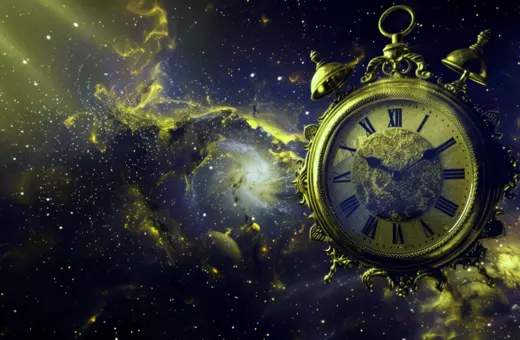The concept of time is indispensable in modern physics, yet in our equations for quantum gravity it is shown to disappear. Some have accepted the fundamental timelessness of nature and others have sought a deeper theory in which time is recoverable, but other physicists and philosophers of physics have attempted a different approach – to show that time emerges from a timeless world. While some have critiqued this notion of emergence on metaphysical grounds, Eugene Chua argues that we should instead critique theories of emergent time on the merits of their physical arguments which, as Chua points out, aren’t as coherent as some of their proponents might think.
In Jean-Baptiste Racine’s 1669 play Britannicus, the character Narcisse famously remarked that “il n’est point de secrets que le temps ne révèle”: there are no secrets that time does not reveal. However, as modern physics probes deeper into the nature of our world, it seems as though time itself may be the greatest secret of all.
In practice, time is utterly familiar - something counted by alarm clocks and heartbeats - while in our most promising theories of quantum gravity, time vanishes, leaving us with a frozen reality. In order to see how time may come undone at the frontiers of physics it is helpful to see how our conception of time has changed throughout history.
Time from Aristotle to Einstein
Earlier thinkers tended to assume the existence of a universal time which flows independent of any particular object. Aristotle, in the Physics, understood time as “equally everywhere and in everything” even though it was dependent on the changes of particular objects. In the Scholium of the Principia, Isaac Newton presented a distinctively mathematical picture of time, though similar in flavor to Aristotle’s universal time: “Absolute, true, and mathematical time, of itself, and from its own nature, flows equably without relation to anything external”.
___
We can broadly distinguish approaches where the self is something that emerges out of mental processes, which we might call a “persona”, from approaches where it’s something that underlies and enables mental processes, which we might call a “substrate”.
___
This idea, of a unique objective Now that you and I share across arbitrary distances, remained firmly entrenched in the history of thought despite parallel debates about the nature of space — until Einstein’s special theory of relativity, that is. Special relativity implored us to give up the assumption of an objective notion of simultaneity for relatively moving objects, and the universal nature of time along with it: there is no Lorentz invariant notion of simultaneity, and hence no notion of a global ‘instant’ with which to constitute time. Simultaneity is an observer-dependent notion, and observers in different states of motion can disagree on whether two things occur simultaneously or otherwise, something Rietdijk (1966) and Putnam (1967), among others, use to great effect in arguing that the future and past are just as real as the present, contrary to our pre-theoretical intuitions.






















Join the conversation